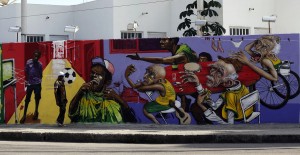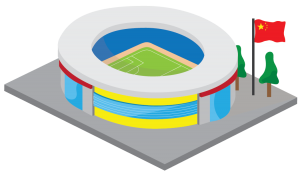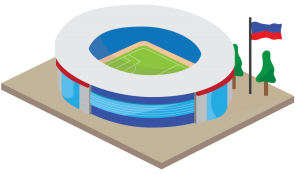BRAZIL NOT only hosted the 2014 Fédération Internationale de Football Association (FIFA) World Cup; it also stirred a myriad of controversy. Ever since the country won the bid in 2007, many questioned whether or not a developing country should host one of the largest international sporting events.
At the time of selection, Brazil’s economy was expanding at a rate of 4.5% due to generous foreign investment in anticipation of the games. But after the Global Financial Crisis of 2008 to 2009, much of the investment was gone.
This, along with the massive spending—conservative estimates go as high as $11.7 billion—on the World Cup, has led to several instances of Brazilians taking the streets in protest. Subway workers fronted such rallies, demanding for a wage hike.
As to whether or not the investment will pay off is yet to be seen, as all of the smoke has yet to clear. Though there has been positive reaction from football fans across the globe, there is very little indication that the Brazil World Cup will be more controversial than any other.
Citizens’ call
Gino Trinidad, an instructor from the Political Science Department, finds the development to be hardly surprising. He stresses that the situation must be analyzed from the context of last year, when Brazilians in São Paulo rallied against the 50-cent increase in bus fares.

A man walks past by the graffiti painted on the a wall in reference to the 2014 World Cup in Rio de Janeiro (Photo by Sergio Moraes, Reuters)
In a Huffington Post article by Flávio Dino, head of the Brazilian Tourism Board, previous street protests in Brazil against fare increase has prompted authorities to reduce the prices. He asserts that citizen activism in Brazil has reaped viable solutions from the “debate on a referendum for political reform” to improved health care via the More Doctors program.
“You already had this kind of thinking way back [in] June 2013. Here, we are hosting an event. We are trying to refurbish stadia to meet FIFA’s standards, and these are very costly standards,” Trinidad says.
Department of Sociology and Anthropology Professor Fernando Zialcita, who has a doctorate in anthropology and is an expert in Latin American studies, sums the World Cup situation as “a classic dilemma on long-term gains versus short-term gains.”
“I understand Brazil wants to project itself to the world as a nation that has finally arrived. [As] a member of Brics [Brazil, Russia, India, China and South Africa], it’s one of the largest economies now,” he adds. Brics is a rising group of developing countries with rapidly growing economies.
However, the Brazil economy grew sluggishly by 0.2% in the first quarter of 2014. Trinidad traces this back to the 2008 crisis that not only yielded higher wages but also higher inflation. “In real terms, there’s no purchasing power. The real wage scales are very stagnant, let’s say, at the least,” he adds.
According to a 2014 survey from the Pew Research Center, 61% of Brazilian citizens believe that the government should prioritize its spending on health care, education and public transportation rather than the World Cup.
“There is still a large mass of Brazilians that are poor. [Citizens are] complaining about the poor transport sector [and] the slums,” says Zialcita. He adds that poor public infrastructures should be resolved first before building new stadiums.
Rousseff’s fate
After Brazil won against Croatia in the opening match of the World Cup, part of the crowd sang crude chants against Brazilian President Dilma Rousseff. But despite the backlash, she was dubbed a frontrunner in public polls for the upcoming elections this October.
According to the New York Times, Rousseff was criticized for shelving projects on water pipes and sewage lines for the construction of a lavish stadium. In the article, she defended herself against critics about using loans from state banks in funding the new stadiums.
But Trinidad argues that spending through banks and loans is prone to corruption. As he points out, the worst-case scenario is that the government siphons off its funds for construction.
“[The] problem [is, there] was too much consumption without investment. If you can summarize what happened, the Rousseff government prioritized consumption economics rather than investment economics,” says Trinidad.
Trinidad sees an inconsistency on economic policies vis-à-vis the reign of former President Luiz Inácio Lula da Silva. “You have positive fruits from the [past] regime. It’s just that the negatives have been amplified because of the prioritization of the infrastructure and government spending for FIFA,” he says.
Amid cynical remarks over the Games, Rousseff shrugged these off in the closing ceremony, declaring the World Cup a success. The succeeding events, as Trinidad points out, can affect how Rousseff’s party crafts their campaign strategy.
Pride of the game
Football fans around the world made sure to let everyone know who they were rooting for, with tweets and status updates about the games dominating social media. Fans also mentioned the hosting of Brazil and how welcoming they were to fans from around the world.
Thousands of miles away, Ateneans are also cheering for their own team, as “[it] is one of the more feared schools in Philippine Football, and it’s because [of] determination and school spirit,” says Enrique Ortiz, a freshman who plays for the Ateneo Mens’ Football team.
This spirit means that football is one of the Ateneo sports that usually garners a large crowd in games. “Improvements had been very apparent with regard to the popularity of the sport,” says Margen Ariel, Physical Education instructor and former Philippine Team player in Women’s Football and Futsal, lauding the growth of local football institutions.
Trinidad commends the nature of the game as “its own animal.” Ortiz agrees with this sentiment, adding, “The World Cup is one of the oldest sporting events in history. I think what makes the World Cup so much bigger is the prestige that it carries with it.”
As the world continues to hail Brazil for its hosting stint, the outcome has pressured the country to plan ahead in time for another major sporting event — the 2016 Summer Olympics in Rio de Janeiro.
[seperator style=”style1″]A history of Olympic controversy[/seperator] [columns][three-columns]A History of Olympic controversy
The 2014 Fédération Internationale de Football Association World Cup is not the only controversial sporting event. The Olympics have had its own share of problems, ranging from financial mismanagement and corruption of safety issues. (Illustrations by Meg C. Quintos) [/three-columns][three-columns]
2000 Sydney Summer Olympics
The Millennium Olympic Games is infamous for a number of its participants being stripped of their medals. Romanian Andreea Răducan became the first Olympic gymnast to be stripped of a gold medal after testing positive for prohibited substances. Răducan’s case was just the first of several, which led to more stringent drug testing in the Games.
[/three-columns][three-columns]2004 Athens Summer Olympics
The 2004 Summer Olympics was an event far bigger than Greece could afford. This would become more apparent in later years, when Greece’s issues of financial mismanagement would manifest itself in the Eurozone Crisis. In addition to overspending on facilities, the event itself suffered from poor officiating. Yang Tae-young of South Korea was incorrectly given a start value of 9.9 instead of 10.0 by judges in the parallel bars portion of the all-around gymnastic event final. The 0.1-point was a large enough discrepancy to have possibly given Yang the gold.
[/three-columns][/columns] [columns][three-columns]2008 Beijing Summer Olympics
Choosing Beijing as a host city was deemed controversial in the midst of China’s horrific human rights records. To pave way for construction, 1.25 million Chinese citizens were evicted from their homes as reported by the Centre on Housing Rights and Evictions. Security was tightened to combat against the terrorist attacks from Xinjiang separatists and protests from pro-Tibetan independence groups. During the Games, a major scandal erupted when four female Chinese gymnastic gold medalists from the women’s artistic team all-around category were accused of being under 16. Although they were eventually cleared of charges, the scandal resurfaced when Dong Fangxiao, who lied about being 17 in the 2000 Summer Olympics, was proven guilty. Fangxiao’s team’s bronze was surrendered to the International Olympic Committee.
[/three-columns][three-columns]2010 Vancouver Winter Olympics
The 2010 Winter Olympics was met with many safety issues. It began with the death of Nodar Kumaritashvili of Georgia, who fell off his sledge and hit a steel pillar while training for the luge event. In a report published by International Luge Federation (IFL), the sled used by the victim had met ILF standards but the track was found to be faster than calculated. ILF still found the speed to be manageable but they did not expect Kumaritashvili’s fatal blow to happen. They pledged to reassess the sled design and track technology to avoid similar accidents. Meanwhile, other cases of injury followed, starting with Anja Pärson of Sweden who was badly bruised following a jump prior to the finish line in Women’s Downhill. Similarly, her injury was blamed on the extreme difficulty of the courses.
[/three-columns][three-columns]2014 Sochi Winter Olympics
Prior to Sochi 2014, President Vladimir Putin approved a law that banned spreading “propaganda of non-traditional sexual relations” to minors. The law attracted global backlash as it potentially undermines Russian lesbian, gay, bisexual and transgender (LGBT) rights. As protest, 40 human rights organizations vowed to use their presence to protect the seven openly LGBT athletes in the Olympics from homophobia. Aside from LGBT concerns, the Russian government also faced accusations of corruption from cost inflation for construction to cronyism. Sochi 2014 became the most expensive sports event in history with a massive budget of $51 billion, surpassing the $40 B budget spent in Beijing 2008.
[/three-columns][/columns]








